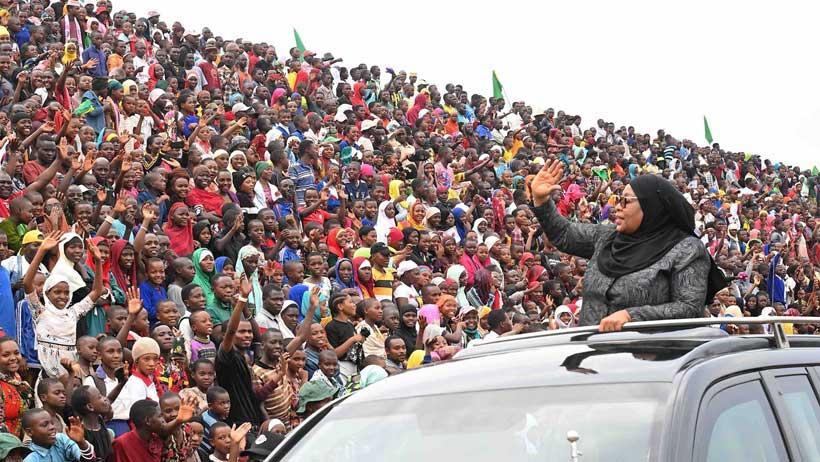By
Rashidi M. Makwega
Africa-Press – Tanzania. As Tanzania nears its 2025 general elections, the event marks a crucial moment for citizens to actively shape the country’s political future. Formed through the union of Tanganyika and Zanzibar on April 26, 1964, Tanzania spans approximately 947,303 square kilometers and has a population of around 61.7 million people: 30 million men and 31.7 million women. The mainland accounts for about 59.8 million residents, while Zanzibar is home to roughly 1.89 million. A majority of Tanzanians (65.1%) live in rural regions, with the remaining 34.9% in urban centers.
In this digital age, social media has emerged as a powerful force in the political arena. It serves as a vital tool for connecting with voters, sharing timely information, and encouraging political conversation. Yet, like a double-edged sword, it can either support democratic progress or fuel disruption. With technology becoming deeply embedded in daily life, social media’s influence is undeniable across sectors, especially in politics. The upcoming 2025 elections are expected to be significantly shaped by the growing use of digital platforms among citizens and political stakeholders.
Drawing from the thoughts of the late diplomat and international relations expert Henry Kissinger, we see how elections intersect with diplomacy and leadership. In his works Diplomacy and World Order, Kissinger highlighted key points:
Legitimacy through Elections: He emphasized the importance of elections in legitimizing leadership, as elected governments draw their authority from the people’s consent.
Elections and National Priorities: Kissinger believed elections should promote national unity and sustainable development, not just political interests.
Global Stability: Poorly managed elections, he noted, could create divisions and instability, both nationally and internationally.
Objective of This Article
This piece explores the growing role of social media as Tanzania heads into the 2025 elections, evaluating its potential to both positively shape or negatively impact the nation’s democratic journey.
Encouraging Civic Engagement
Social media platforms like Facebook, Twitter, WhatsApp, Instagram, and TikTok have made political content more accessible, even to rural citizens. Voters can now participate in discussions, voice opinions, and connect with candidates. These platforms also offer a cost-effective way for campaigns to reach the public compared to traditional outlets like radio and television.
Spreading Election Information
Digital platforms deliver timely updates on campaigns, polling, and results. They enhance transparency and allow real-time reporting of irregularities, which may help reduce conflict during election result announcements.
Boosting Democratic Involvement
Social media provides a space for open debates on national policies and future development. It encourages accountability and inspires more citizens to engage in the political process.
Detecting and Preventing Fraud
Citizens can use these platforms to highlight electoral misconduct or irregularities, pressuring institutions to uphold fairness and accountability.
Propaganda Campaigns
Political actors use social media to promote their agendas. These efforts can be
Constructive, helping spread development ideas efficiently.
Destructive, involving misinformation and fake news, which mislead voters and harm the integrity of the electoral process, especially among those unaware of how these tools can be misused.
Growing Political Polarization
Social media often creates echo chamber spaces where users only see content that aligns with their beliefs, fueling division and reducing the chance for consensus-building.
Spread of Hate Speech and Identity-Based Tensions
Platforms can be misused to incite hatred based on religion or ethnicity. This poses a serious threat, especially amid existing ideological divides in Tanzania.
Online Abuse and Intimidation
Public figures, particularly women, journalists, and activists, often face threats or harassment online. This discourages participation and silences diverse voices. Social media is increasingly used to discredit those working for national progress.
Foreign Influence
There’s a risk of external actors manipulating digital platforms to sway public opinion or trigger instability. With some local leaders seeking foreign backing and debates over constitutional reform heating up, foreign interference is a growing concern.
Incitement and Mobilization of Violence
Social media can be used to organize protests or even incite violence, especially when election outcomes are contested. Phrases like “No Reforms, No Elections” gaining popularity online are stoking divisions among citizens demanding constitutional changes.
Erosion of Trust in the Electoral System
False accusations of election fraud circulating online can undermine public confidence in democratic institutions. Even if elections are free and fair, the perception of bias can lead to unrest. In Tanzania and across Africa, result announcements often cause disputes, highlighting the need for electoral reform and a truly independent commission.
Addressing the Challenges of Social Media Use
To reduce negative impacts, collaboration among all stakeholders is essential. Key strategies include
Clear Regulations: The Tanzania Communications Regulatory Authority (TCRA) must establish and enforce guidelines that curb hate speech and misinformation while respecting freedom of expression.
Digital Literacy Education: Citizens, especially the youth, need to be trained to recognize misinformation and use social media responsibly. Schools and community organizations should take the lead in promoting digital citizenship.
Conclusion
With the rapid rise of technology and increased use of social media in Tanzania, it’s clear that these platforms will play a defining role in the 2025 elections. If used responsibly, social media can strengthen democracy, promote civic participation, reduce election fraud, and communicate policy ideas more efficiently.
However, without proper regulation and awareness, it can deepen political divides, spread falsehoods, incite violence, and undermine trust in electoral systems.
It is up to the government, political actors, civil society, the media, and citizens to ensure social media is used constructively. This includes promoting responsible digital behavior, enacting human rights-respecting laws, and ensuring shared accountability.
Tanzania, a nation known for its peace and unity, must protect these values. Instead of letting digital platforms be tools of division, they should serve as vehicles for building a strong democracy and inclusive progress for all citizens.
moderndiplomacy
For More News And Analysis About Tanzania Follow Africa-Press







